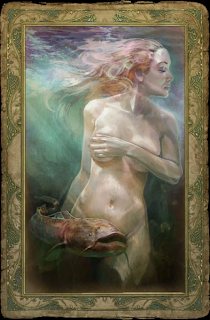I have often pondered the character dilemma in computer RPGs. Either you are given a fixed character to play, with a relevant story but less personal input. Or, you create your own character but the story needs to be generic enough that their personality doesn't matter all that much. Basically, Planescape: Torment versus Baldur's Gate.
Sure, the moral choice systems and character development have improved over the years, but personality and story options remain fairly limited. That doesn't make these games terrible, and it's something I would generally accept. If I want a more customisable experience I probably won't look to computer games for that. But can that flexible story actually be achieved in video gaming?
April 16th is the release date for
Sleep is Death, a new independent game by Jason Rohrer. It's a storytelling game, or perhaps more accurately a set of tools for collaborative storytelling. The two-player experience involves one controller who sets up the game world and scenes, and one player who chooses the actions of their avatar.
I'm a pencil-and-paper roleplayer, and already quite comfortable with a
GM (or controller, if you like) generating a game world and narrative, as well as my potential role as a player in shaping that story. I have to wonder how SiD differs from what people like me are already doing. Is there something more to this than simply adding some basic graphical tools for a process that is already occurring in many homes and online communities? And do those graphics really add something valuable to the storytelling experience, beyond the pictures and sensations we can already create in our imaginations (with effectively zero limitations, I might add)?
There is an attempt at answering the question of "How does this differ from playing a game like Dungeons & Dragons?"
in this article. It seems pretty inadequate to me, so if anyone can link to better discussion I'd love to to read it.
(1) Turns have a time limit, making the game less about planning ahead or goal setting, and more about on-the-spot improvisation.
Okay, I will admit this is different (although I have played in games where we sometimes introduced a time limit for player turns). I don't necessarily agree that it serves the experience, though. I'm just not the sort of person who can easily think fast. I find that even in a more relaxed pencil-and-paper roleplaying environment I feel under pressure to make decisions and can't always keep up. If I am limited to 30 seconds my character is probably just going to stand there gaping at the world. "Cha is paralysed with indecision" doesn't create a particularly compelling story.
I will admit that a common issue when roleplaying is staying focused, and keeping the story moving. A time limit on your turn is one potential way to deal with this. But I really hope that 30 second time limit can be changed, because otherwise you are limited to fairly frantic storytelling experiences.
Also, that thing about planning ahead and goal setting? My best roleplaying experiences have been when I had a good sense of the character I was playing, both in terms of personality and their goals. Without that sense I may be able to fly by the seat of my pants and create
something, but I find it a huge barrier to immersion. I have more satisfying storytelling experiences when I have time to create deeper underlying motivations, and follow their development.
(2) It removes the awkwardness and embarrassment of face-to-face roleplaying.
Wow. All I can really say here is that someone has clearly had some very different experiences to me. The social aspect of roleplaying seems to be one of the most important parts for many of my friends. While it can sometimes be a struggle to get people to focus and take something seriously, I don't think embarrassment has much to do with that. In my experience it's more likely to be that some people are easily side-tracked into gossip and anecdotes.
This also ignores the large number of online text-based roleplaying communities that currently exist, and might solve this problem just as well.
---
The other glaring difference between SiD and most roleplaying is the number of players. As I mentioned before, I don't always think fast. And in a multiplayer roleplaying group I usually have someone else to pick up the slack if I am unsure of how to proceed. There is also a lot more scope for interesting interactions with all those personalities bouncing off each other. One player and one controller is far more limited.
Now, I'm not saying that Sleep is Death
should necessarily conform to my personal preferences when it comes to collaborative storytelling. It likely has different goals. But, having established some of what it
isn't likely to do for me, I have to wonder what it
is... and whether I'm can find anything valuable here for me personally.
If the tools are good enough, I imagine this might really assist beginner GMs. I might snobbily consider it a training ground for my concept of "real" collaborative storytelling. I could potentially use it to improve my quick decision making.
The idea of graphical tools as aids to collaborative storytelling is an interesting one. I potentially think of SiD being for text-based online roleplaying what a battle map with miniatures are for pencil-and-paper gaming. Some of us are a bit resistant to the battle map. It harks back to a wargaming heritage, and "playing by the numbers", which makes the whole situation seem very artificial. That said, it can be valuable for giving people some sense of their environment. So, I can appreciate that having some simple graphics could really help some people to properly imagine a scene.
That sort of idea has a lot of potential. But I suppose I'm concerned about something that may appear to facilitate creativity while also placing limits around it. I have this unfortunate habit of wanting to push against those limits. It's also very difficult to find the people who would make really good controllers. The popular reviewers have been lucky enough to experience SiD with Rohrer as controller, and I'm sure he knows how to spin a decent tale.
Overall I'm pretty sceptical about the whole thing, and wonder if my roleplaying goggles are causing me to miss something. If anyone does try out this game I would really love to hear about your experiences.







 Subscribe
Subscribe Follow Twitter
Follow Twitter